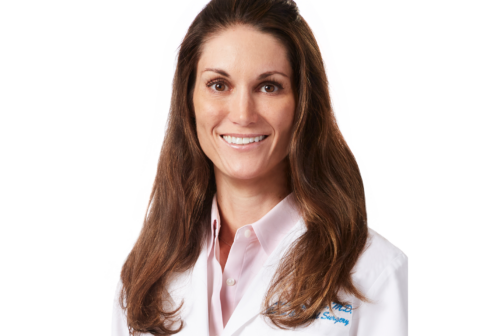Loose skin, excess fat, and lax abdominal muscle can sometimes limit your abdominal appearance no matter how many stomach crunches you do. If you are bothered by the less than sleek appearance of your stomach, a tummy tuck (abdominoplasty) may be a good option for you.
What is a tummy tuck?
A tummy tuck surgically removes redundant skin and unwanted fat from the abdominal area and may also tighten the muscles of the abdominal wall. An incision just above the pubic area is used to remove excess skin and fat from the middle and lower abdomen. When possible, the incision will be kept within average swimsuit lines. The incision length will depend upon the amount of loose skin to be removed. Using this incision, the surgeon may tighten the abdominal muscles if needed, by pulling them together and stitching them in place. The surgeon will also trim any excess skin from the lower abdomen. Though it is not always possible to remove them all, stretch marks are often removed with the excess skin. A second incision around the navel is used so the skin can be pulled down and the excess removed. In this instance, the navel will remain intact in the underlying tissue, but will be exposed through a new section of skin. The result is a sleeker profile and a tighter, flatter tummy.
Am I a good candidate for abdominoplasty?
Abdominoplasty offers great benefits to health men and women of all ages. It is best suited to those in relatively good shape, but with loose abdominal fat that won’t respond to dieting or exercise. Men or women bothered by any of the following conditions are often good candidates for a tummy tuck:
Loose, sagging abdominal skin
Excess fat in the abdominal area
A protruding abdomen
Abdominal muscles weakened by pregnancy or aging
Because pregnancy and weight fluctuation can affect your tummy tuck result after surgery, many postpone their procedures until they plan no more children and their weight is stable. Abdominal scars from previous surgeries can limit your abdominoplasty result. Though in some cases, such as with many Cesarean section scars, the new incisions can be made below the existing scar which can then be removed at the time of your tummy tuck.
What should I expect from a consultation for my tummy tuck?
A personal consultation with your surgeon is the first step for any patient considering abdominoplasty. I believe in careful patient consultation to assess your physical and emotional health, discuss your aesthetic goals, and address questions or concerns. Issues you should be prepared to discuss during consultation include medical conditions, current medications, previous surgeries, weight loss history, and goals. During the consultation I will evaluate the quality and elasticity of the abdominal skin, the status of the underlying abdominal muscles, amount of excess fat in the area, and the location of any existing scars. In patients with limited issues to correct, I may suggest alternate treatment options, such as liposuction or a mini-tummy tuck.
Proper diet and exercise does not always result in the flat stomach you seek.
What is a mini-tummy tuck?
A full, traditional tummy tuck is not needed for all patients. Some patients will achieve the results they seek with a limited or “mini” abdominoplasty. Liposuction alone may also meet the needs of some. The “mini” abdominoplasty procedure is used to correct issues in the lower abdomen only. It entails less scarring than a full tummy tuck, but will not address loose skin above the navel. Liposuction alone is viable only in those with good skin elasticity and muscle tone. Though liposuction can remove abdominal fat, it cannot smooth loose skin or tighten abdominal muscle. It is, however, a popular option for women who are planning future pregnancies.
Are there safety concerns associated with a tummy tuck?
Though thousands women undergo tummy tuck surgery each year and experience no major complications, the procedure does carry some degree risk. It is important you be well informed of these risks when considering tummy tuck. I view the discussion of potential risks and complications as one of the most important aspects of patient consultation. During your consultation, I will discuss these potential complications with you, listen to your safety questions, and offer instructions on how to minimize your risk.
What should I expect during my recovery?
In my practice, I use advanced techniques to foster faster recovery in all patients. Directly after surgery, you’ll be taken to a recovery area. To prevent the accumulation of fluids, small drainage tubes will have been placed beneath the skin. Though you will feel some soreness, it is generally well-controlled with pain medication. Dressings may be applied to your abdomen and covered with tape or an elastic bandage. To promote blood circulation, you will be encouraged to get up and move around soon after surgery. Bending and lifting, however, should be avoided at this stage. Sleeping on your back with your knees up may also be recommended for the first few weeks after surgery. Soon after surgery, you may begin to notice an improvement to your abdominal shape. As you heal and your swelling subsides, your firmer, sleeker contour will begin to emerge. Many tummy tuck patients report a boost in their confidence and a heightened body image after surgery. Though your tummy tuck scarring is permanent, it is generally easy to conceal beneath undergarments and will fade significantly over time.
Generally, you can expect long-lasting results from your abdominoplasty procedure. If you maintain a fairly steady weight, you can expect to keep your new contour for many years. Gravity, aging, and weight fluctuation may loosen the abdominal skin somewhat. If this occurs, additional surgical treatment can be used to restore your sleek contour.
What should I look for in a plastic surgeon to perform my tummy tuck?
Not all physicians who perform cosmetic surgery have had formal surgical training. It’s important to research the credentials of all surgeons you consider for your procedure. Choose a plastic surgeon who is fully trained in plastic and reconstructive surgery as well as Otolaryngology (head and neck surgery). And, of course, make sure your surgeon is board certified by the American Board of Plastic Surgery. Surgeons with this certification have completed a minimum of five years of surgical training following medical school, including a plastic surgery residency program. During this intensive program, surgeons learn to perform surgical procedures for the entire body and face. At the same time, they develop their technical skill and aesthetic judgment. After training, a surgeon must pass comprehensive oral and written exams before being granted certification. Both the American Society of Plastic Surgeons and the American Society for Aesthetic Plastic Surgery require their members to be certified by the American Board of Plastic Surgery. Plastic surgeons with this certification have completed approved training and examinations in plastic surgery including both cosmetic and reconstructive procedures. It is very important to find out if your surgeon has operating privileges in an accredited hospital for the procedure you are considering, even if you are planning to undergo surgery in your doctor’s office or at a surgery center. Before granting privileges, hospital review committees evaluate a surgeon’s training and competency for specific procedures.
Dallas plastic surgeon Dr. Steven J. White is one of the few plastic surgeons in the United States certified by both the American Board of Plastic Surgery and the American Board of Otolaryngology/Head and Neck Surgery. He dedicated eight years to residency training after medical school in order to be fully trained in both specialties. Dr. White received his training in Otolaryngology (ENT or Ear, Nose, and Throat Surgery) at UT Southwestern Medical Center and Parkland Memorial Hospital in Dallas. He then returned to Baylor College of Medicine in Houston for his residency in plastic and reconstructive surgery. Dr. White is a member of the American Society of Plastic Surgeons and a Fellow of the American Academy of Otolaryngology – Head and Neck Surgery. He is also a member of the Double Boarded Society, as well as numerous other medical societies. Patient safety and natural appearing results are Dr. White’s primary goals. He only uses doctors (anesthesiologists)— not nurses (CRNA’s or anesthetists)—to administer anesthesia to maximize patient safety. He operates at fully accredited surgery centers and hospital operating rooms. For the convenience of his patients, he maintains privileges at several area hospitals. During the initial consultation, he listens carefully to his patients’ concerns and goals for surgery. He enjoys teaching and believes it’s important for patients to be well informed about what to expect before, during, and after surgery.
He is committed to obtaining the best result with each operation he performs. Careful attention to detail during surgery allows for natural appearing results—thereby avoiding the “overdone, operated look.” Almost any operation can be performed quickly; however, performing a task to the best of one’s ability generally takes some time. Dr. White believes it’s worth this extra effort to obtain the most natural results.
214-696-6676
Author







